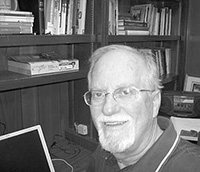The Southern Baptist Convention has arrived at a decisive and defining juncture in its long and celebrated history.
 Don Kirkland
Don KirklandAt the opening plenary session of the SBC Executive Committee in Nashville on Sept. 21, Morris Chapman announced that he would retire on Sept. 30, 2010, as that body’s president and chief executive officer.
That action followed closely on the heels of Jerry Rankin’s announcement that he would retire on July 31, 2010, as president of the International Mission Board. He revealed those plans at the IMB’s Sept. 15-16 meeting in Jacksonville, Fla.
Neither announcement caught SBC watchers by complete surprise. The timing of the departures may have.
Less expected by some, yet deemed necessary by trustees, was the abrupt resignation at the North American Mission Board of its president, Geoff Hammond, along with three of his associates — announced on Aug. 11 at the board’s headquarters in Alpharetta, Ga., and effective immediately.
This may be the first time since the SBC was established in 1845 that search committees will seek to fill those key positions at relatively the same time.
The resignations at NAMB came as the board was embarking on a partnership with state conventions and local associations to encourage every Southern Baptist church to be engaged in church planting by 2020 under the initiative called God’s Plan for Sharing (GPS).
Also, all three vacancies occur as Southern Baptists are anticipating the specifics of a Great Commission Resurgence to be unveiled at the meeting of the SBC in Orlando, Fla., next June.
A task force selected at the Louisville SBC meeting is at work now on a strategy — borrowing the words of task force chairman Ronnie Floyd of Arkansas — to “more faithfully and effectively fulfill the Great Commission around the world, in our churches, in our state conventions, in our national convention and all we do together” as Southern Baptists.
The confluence of these streams of Southern Baptist life could not come at a more opportune — and surely a more crucial — moment in the continuing story of our denomination.
In coming months, the future of the Southern Baptist Convention will likely be determined for good or ill.
At stake in all of this — and, some would say, at risk — is the future of the Cooperative Program as we know it. How will Cooperative Program funds be distributed with the advent of the Great Commission Resurgence, and will the CP itself, begun in 1925, be redefined?
Already, the fear is afloat that the GCR task force may give more emphasis to “the uttermost parts of the earth,” to the disadvantage of “Jerusalem, Judea and Samaria.” There will be — in fact, there already is — a concerted effort to move state conventions toward at least a 50-50 split of Cooperative Program funds between state and national causes.
The question also is being asked: How would this increased flow of dollars to the SBC impact the ministries of, say, the South Carolina Baptist Convention, and, particularly, its institutions?
And this: What is the Cooperative Program, anyway? Should it include church contributions that are designated for specific SBC causes or entities? By definition, such donations do not count as Cooperative Program funds, for they cannot be distributed according to a set CP formula.
In the minds of advocates of the current Cooperative Program structure, designated giving is a throwback to the Southern Baptist way of doing business prior to 1925, when entities and causes, in a sense, competed with each other for pieces of the offering pie.
The task force working toward the design and implementation of the Great Commission Resurgence must — as a part of its proceedings — deal with the diverse views held by Southern Baptists on the role of the Cooperative Program in funding this initiative as well as the structure of the CP itself. In its deliberations, must the task force single out any “sacred cows” to receive either undeserved protection or unwarranted preservation? It has been suggested that the answer to that question is “no.” Is the Cooperative Program a “sacred cow?” Or is it a “sacred how,” as described by John Sullivan years ago?
Southern Seminary president Al Mohler believes that Southern Baptists are “way past” issues from both 1845 and 1925. The question, he says, is this: What does faithfulness to Christ require of us today?
It is the right question. The answer we give will be a witness to our willingness as Christ-followers to carry out the Great Commission and a forecast of the future of a Southern Baptist Convention worthy of its name.